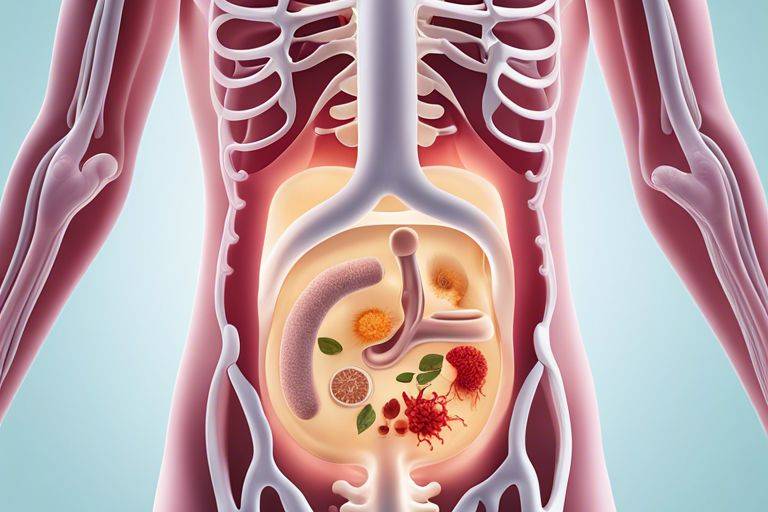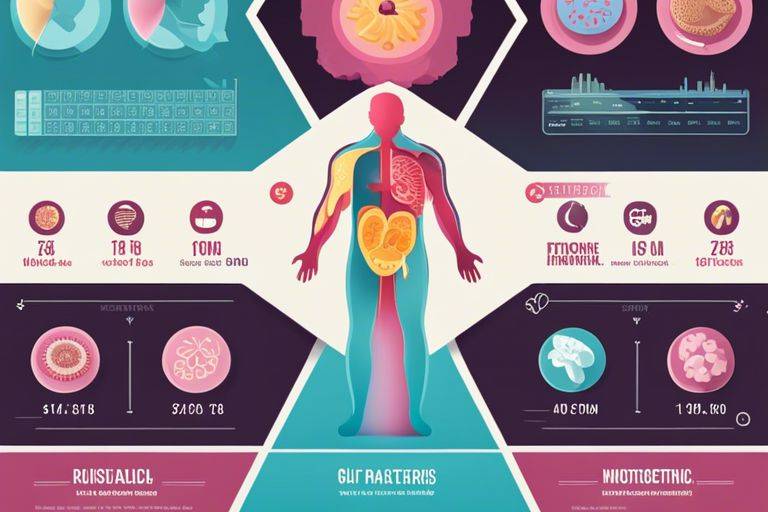You may not realize it, but your gut health plays a critical role in boosting your immunity. Research has shown that a large portion of our immune system resides in the gut, making it vital to keep this system healthy and balanced. If you want to boost immunity, look to the gut. Learn more about the connection between gut health and your immune system here.
Key Takeaways:
- Gut microbiota: The balance of good and bad bacteria in your gut plays a crucial role in your immune system’s health.
- Immune response: A well-functioning gut helps regulate inflammation and immune response in the body.
- Leaky gut: A compromised gut lining can lead to “leaky gut,” allowing harmful substances to enter the bloodstream and trigger immune responses.
- Probiotics: Consuming probiotic-rich foods or supplements can help maintain a healthy balance of gut bacteria.
- Fiber: A diet high in fiber can promote healthy gut bacteria and support proper immune function.
- Stress and gut health: Stress can negatively impact gut health and weaken the immune system.
- Healthy lifestyle choices: Regular exercise, adequate sleep, and a balanced diet all contribute to a healthy gut and strong immune system.
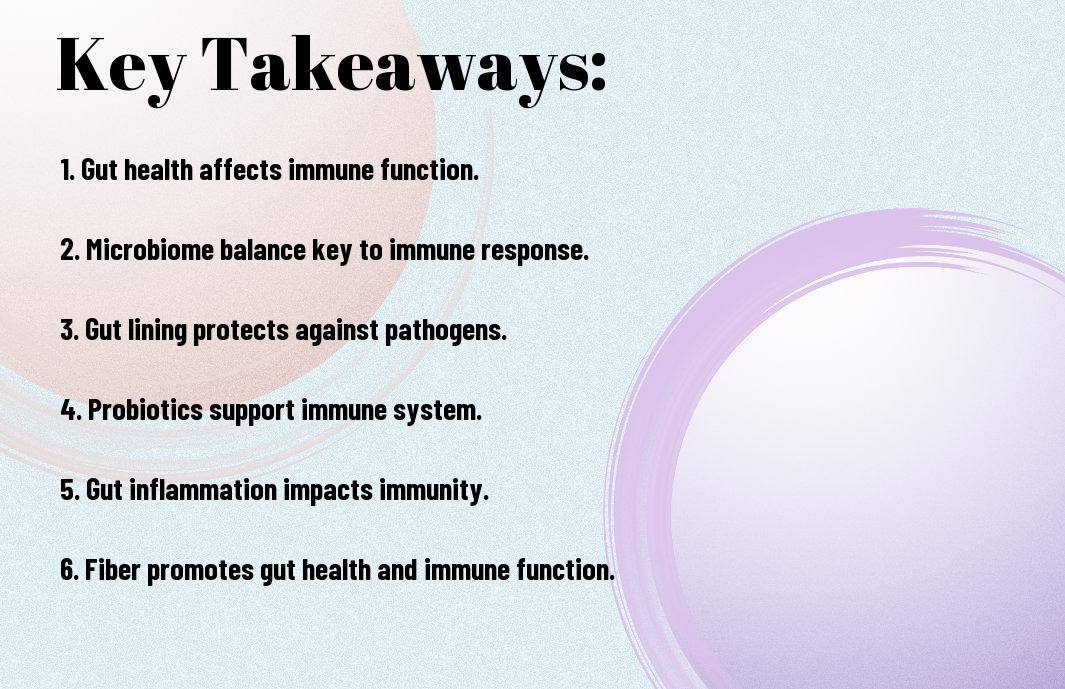
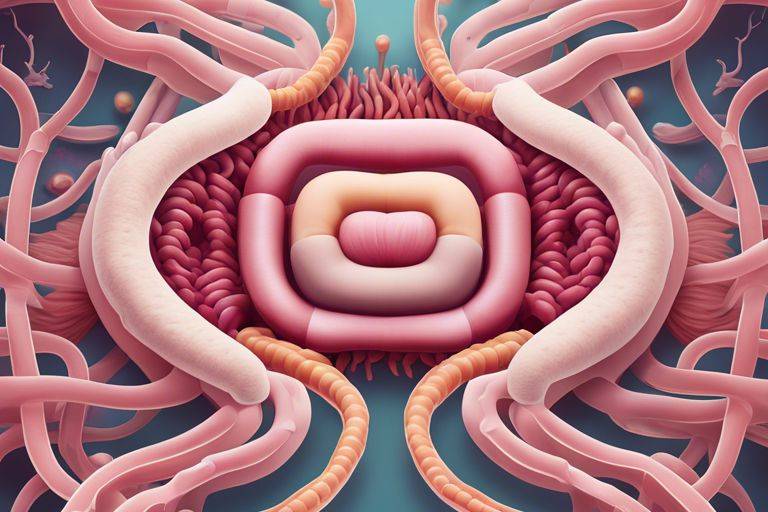
The Gut-Immune Connection
A study on the role of gut microbiota in immune homeostasis and … emphasized the critical link between gut health and the immune system. The gut is home to a complex ecosystem of bacteria, viruses, and other microorganisms that play a crucial role in regulating immune function.
The Gut-Associated Lymphoid Tissue (GALT)
With the Gut-Associated Lymphoid Tissue (GALT) being a significant part of the immune system, it is directly impacted by the health of your gut. The GALT helps protect the body from pathogens that are ingested through food and drink, making it a vital component in maintaining overall immune health.
The Gut as a Barrier Against Infection
GALT acts as a strong barrier against infections entering your body through the digestive tract. It prevents harmful pathogens from crossing into the bloodstream and causing systemic infections. By maintaining a healthy gut lining, you are not only supporting proper digestion but also bolstering your immune defenses.
Against this background, it becomes evident that the gut plays a critical role in not only digesting food but also in protecting our body from harmful invaders. A healthy gut lining ensures that toxins and pathogens are kept at bay, allowing your immune system to function optimally and keep you well.
The Microbiome and Immune System Function
Little is understood about the intricate relationship between our gut microbiome and immune system function. This vast community of bacteria in our digestive tract plays a vital role in regulating our body’s immune responses.
The Role of Beneficial Bacteria
System Much of our immune system is located in the gut, where beneficial bacteria help regulate the immune response. These good bacteria can stimulate immune cells, produce anti-inflammatory compounds, and compete with harmful bacteria for resources, ultimately supporting a strong immune defense.
The Impact of Dysbiosis on Immune Function
An imbalance in gut bacteria, known as dysbiosis, can have a profound impact on immune function. Dysbiosis can lead to increased inflammation, weakened immune responses, and a higher susceptibility to infections and autoimmune conditions. It is crucial to maintain a healthy balance of gut bacteria for optimal immune function.
How Gut Health Affects Immune Response
The Gut-Brain Axis and Immune Modulation
After years of research, scientists have discovered the intricate connection between our gut and brain, known as the Gut-Brain Axis. This communication pathway plays a crucial role in regulating our immune system. Through this axis, the gut can modulate immune responses and inflammation, impacting our overall health.
The Influence of Gut Health on Inflammation
Gut health plays a significant role in regulating inflammation throughout the body. When the gut microbiome is imbalanced, it can lead to chronic inflammation, which is linked to a myriad of health issues. By maintaining a healthy gut, you can reduce inflammation and support a strong immune system.
Another vital aspect to consider is that a disrupted gut microbiome can increase the production of pro-inflammatory cytokines, leading to systemic inflammation. This chronic inflammation can weaken the immune system’s response to pathogens and heighten the risk of autoimmune diseases.
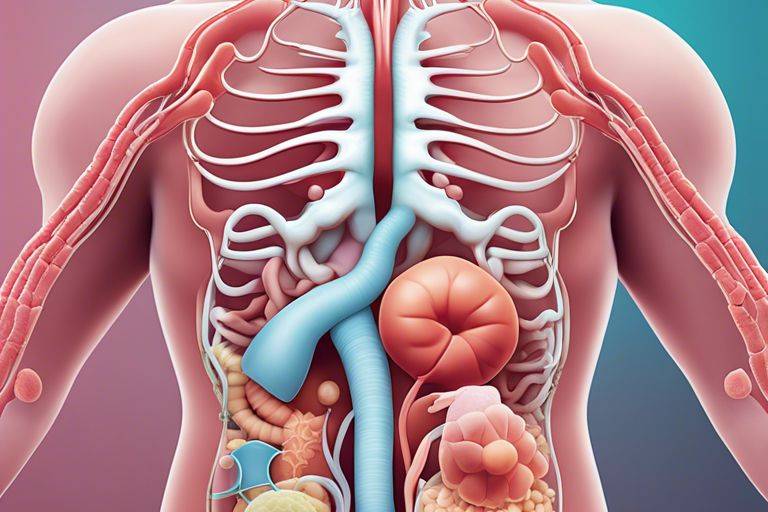
The Consequences of Poor Gut Health
Despite A healthy microbiome builds a strong immune system that could help defeat COVID-19, the ramifications of poor gut health can be far-reaching.
Increased Susceptibility to Infections
Health starts in the gut, and when your gut is not in optimal condition, your immune system may weaken, making you more susceptible to infections. This means that you could find yourself falling ill more frequently and taking longer to recover from common illnesses.
Autoimmune Disorders and Gut Health
Poor gut health has been linked to triggering autoimmune disorders, where the immune system mistakenly attacks the body’s own tissues. In cases like this, the gut’s imbalance of gut bacteria and inflammation can lead to the onset or exacerbation of conditions like rheumatoid arthritis, Crohn’s disease, and celiac disease.
Disorders: It’s alarming to note that the gut’s health plays such a significant role in the functioning of our immune system. An unhealthy gut can lead to a plethora of autoimmune disorders that can significantly impact your quality of life.

Factors that Disrupt Gut Health
To maintain a healthy gut, it’s crucial to be aware of factors that can disrupt it.
- Poor diet: Diets high in processed foods, sugars, and low in fiber can harm the gut microbiome.
- Stress: Chronic stress can alter gut function and impact the balance of good and bad bacteria.
- Antibiotics: While antibiotics can be life-saving, they can also wipe out beneficial bacteria in the gut.
Though…
Diet and Lifestyle Choices
On the flip side, incorporating a diverse range of fruits and vegetables, whole grains, and fermented foods into your diet can promote a healthy gut microbiome. Additionally, managing stress through activities like yoga and meditation can also support gut health.
Antibiotics and Other Medications
Any time I take antibiotics or other medications, it’s important to be mindful of their impact on my gut health. Avoiding unnecessary antibiotic use and discussing probiotic supplementation with my healthcare provider can help maintain a healthy balance of gut bacteria.
Another crucial point to consider is that certain medications like proton pump inhibitors (PPIs) and nonsteroidal anti-inflammatory drugs (NSAIDs) can also disrupt gut health. It’s important to use these medications judiciously and work with your healthcare provider to mitigate any potential negative effects on the gut.
Strategies for Promoting Gut Health
Dietary Changes for a Healthy Gut
Many factors can impact the health of your gut, but one of the most significant is your diet. Increasing your intake of fiber-rich foods like fruits, vegetables, and whole grains can promote the growth of beneficial bacteria in your gut. These foods also help with digestion and regularity, supporting overall gut health.
Probiotics and Prebiotics: What You Need to Know
One imperative aspect of maintaining a healthy gut is incorporating probiotics and prebiotics into your diet. Probiotics are live bacteria that provide numerous health benefits, while prebiotics are a type of fiber that feeds the good bacteria in your gut. Including both in your diet can help maintain a healthy balance of gut bacteria.
Know that probiotics can be found in fermented foods like yogurt, kefir, and sauerkraut, while prebiotics are present in foods like bananas, garlic, and onions. By consuming a variety of these foods, you can support a diverse and thriving gut microbiome.
Stress Management and Gut Health
Dietary choices play a crucial role in managing stress and promoting gut health. Reduce your intake of processed foods, refined sugars, and caffeine, as they can negatively impact your gut microbiota balance. Instead, focus on whole, nutrient-dense foods to support a healthy gut and improve your overall well-being.
Changes in lifestyle practices, such as incorporating relaxation techniques like meditation, deep breathing, or yoga, can also help reduce stress levels and support a healthy gut. By taking care of your mental and emotional well-being, you can positively impact your gut health and overall immune function.
Summing up
So, as you can see, taking care of your gut health is crucial for maintaining a strong immune system. By incorporating probiotic-rich foods, reducing stress, and avoiding unnecessary antibiotics, you can support the balance of good bacteria in your gut and boost your overall health. Note, a healthy gut means a healthier you!
Q: What is gut health and why is it crucial for the immune system?
A: The gut is home to trillions of bacteria that play a crucial role in the immune system. A healthy gut helps to maintain a balanced immune response and protect against infections.
Q: How does the gut impact the immune system?
A: The lining of the gut is a barrier that prevents harmful substances from entering the bloodstream. A well-functioning gut allows for the absorption of necessary nutrients that support immune function.
Q: What are some signs of poor gut health affecting the immune system?
A: Symptoms like frequent infections, digestive issues, food sensitivities, fatigue, and skin problems can indicate an imbalance in gut health that may impact the immune system.
Q: How can diet affect gut health and immune function?
A: A diet high in processed foods, sugar, and unhealthy fats can negatively impact gut health and weaken the immune system. Opting for a diet rich in fruits, vegetables, and whole grains can support a healthy gut and immune system.
Q: What role do probiotics play in supporting gut health and the immune system?
A: Probiotics are beneficial bacteria that can help maintain a healthy balance in the gut microbiome. They support immune function by regulating inflammation and fighting off harmful pathogens.
Q: How does stress impact gut health and immunity?
A: Chronic stress can disrupt the balance of bacteria in the gut and weaken the immune system. Finding ways to manage stress, such as through exercise, meditation, or relaxation techniques, can support gut health and immune function.
Q: What are some lifestyle changes that can improve gut health and boost immunity?
A: Getting regular exercise, reducing stress, staying hydrated, getting enough sleep, and avoiding smoking and excessive alcohol consumption are all lifestyle factors that can support gut health and strengthen the immune system.
